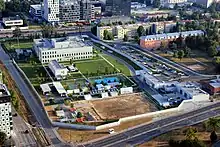Embassy of the United States, Sarajevo
The United States Department of State opened the United States Embassy in Sarajevo, Bosnia and Herzegovina, on July 4, 1994.[2] Bosnia and Herzegovina had formerly been a part of Yugoslavia; the United States recognized the independence of Bosnia and Herzegovina on April 7, 1992.
| Embassy of the United States in Sarajevo | |
|---|---|
 | |
| Location | Sarajevo |
| Address | 1 Robert C. Frasure Street |
| Coordinates | 43°51′23.89″N 18°24′1.5″E |
| Ambassador | Michael J. Murphy[1] |
2001 arrests
In the month following al-Qaeda's terrorist attacks on major American cities of New York City and Washington, D.C., on September 11, 2001, American intelligence analysts became concerned that Arab immigrants in Bosnia and Herzegovina planned to attack the U.S. Embassy in Sarajevo.[3][4]
In early October 2001, under pressure from the United States, six men of Algerian descent were arrested by the police of Bosnia and Herzegovina.[3][4][5][6][7][8][9] Bosna and Herzegovina officials said American officials had assured them that they had evidence, including wiretaps, proving that the six men were in contact with an al-Qaeda leader in Afghanistan, but American officials did not provide that evidence.
From October 2001 to January 2002, the six men went through the Bosnian equivalent of habeas corpus. In January 2002, the case made its way to the Bosnian Supreme Court.
The six men continued to face allegations that they had participated in a plot to bomb the embassy at their 2004 Combatant Status Review Tribunals and at their annual Administrative Review Board hearings in 2005, 2006 and 2007.[6][7][8][9] The men testified that their interrogators had never asked them about the plot, which led them to believe they recognized that there was no plot.
In 2008, after the Guantanamo captives had their access to habeas corpus in the US justice system restored, the United States Department of Justice acknowledged that there had never been any evidence of a bomb plot.[5]
2011 attack
On 28 October 2011, Mevlid Jašarević, a Wahhabi Islamist, fired on the embassy, and wounded a policeman. He was eventually shot and wounded by a Ministry of Interior sniper, was given medical treatment and taken into custody afterwards.[10][11] He was later sentenced to 18 years in prison.[12]
References
- "President Biden Announces Seven Key Nominations". www.whitehouse.gov. Retrieved 16 July 2021.
-
"A Guide to the United States' History of Recognition, Diplomatic, and Consular Relations, by Country, since 1776: Bosnia-Herzegovina". United States State Department. Retrieved 2010-05-16.
Victor Jackovich presented his credentials as American Ambassador on June 23, 1993; however, a physical American Embassy to Bosnia-Herzegovina was not established until November 10, 1993, on the premises of the American Embassy in Vienna, Austria. The American Embassy in Sarajevo was established on July 4, 1994, with Jackovich as ambassador.
- Craig Whitlock (2006-08-21). "At Guantanamo, Caught in a Legal Trap". The Washington Post. Retrieved 2010-05-16.
- Marc Perelman (2007-12-04). "From Sarajevo to Guantanamo: The Strange Case of the Algerian Six". Mother Jones magazine. Retrieved 2010-05-16.
- William Glaberson (2008-11-20). "Judge Declares Five Detainees Held Illegally". The New York Times. Retrieved 2010-05-16.
- "Guantanamo Docket: Mohammed Nechle". New York Times. November 2008. Retrieved 2009-05-02.
- "Guantanamo Docket: Mustafa Ait Idr". New York Times. November 2008. Retrieved 2009-05-02.
- "Guantanamo Docket: Lakhdar Boumediene". New York Times. November 2008. Retrieved 2009-05-02.
- "Guantanamo Docket: Hadj Boudella". New York Times. November 2008. Retrieved 2009-05-02.
- Mackey, Robert; Gladstone, Rick (2011-10-28). "Gunman Fires at U.S. Embassy in Sarajevo". The New York Times.
- "FBI — Individual Indicted in Connection with Machine Gun Attack on U.S. Embassy in Bosnia-Herzegovina in 2011". Fbi.gov. Retrieved 2012-04-29.
- "Bosnia US embassy gunman Mevlid Jasarevic jailed for 18 years". BBC News. 6 December 2012.